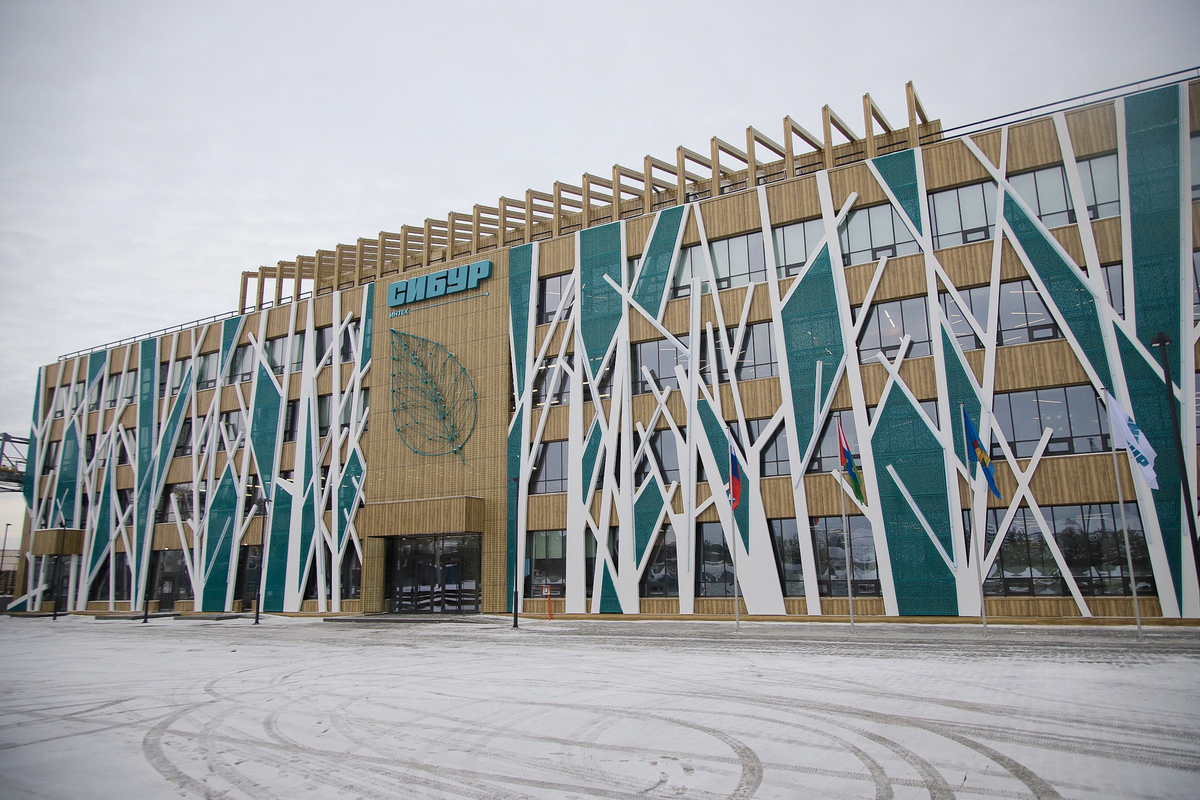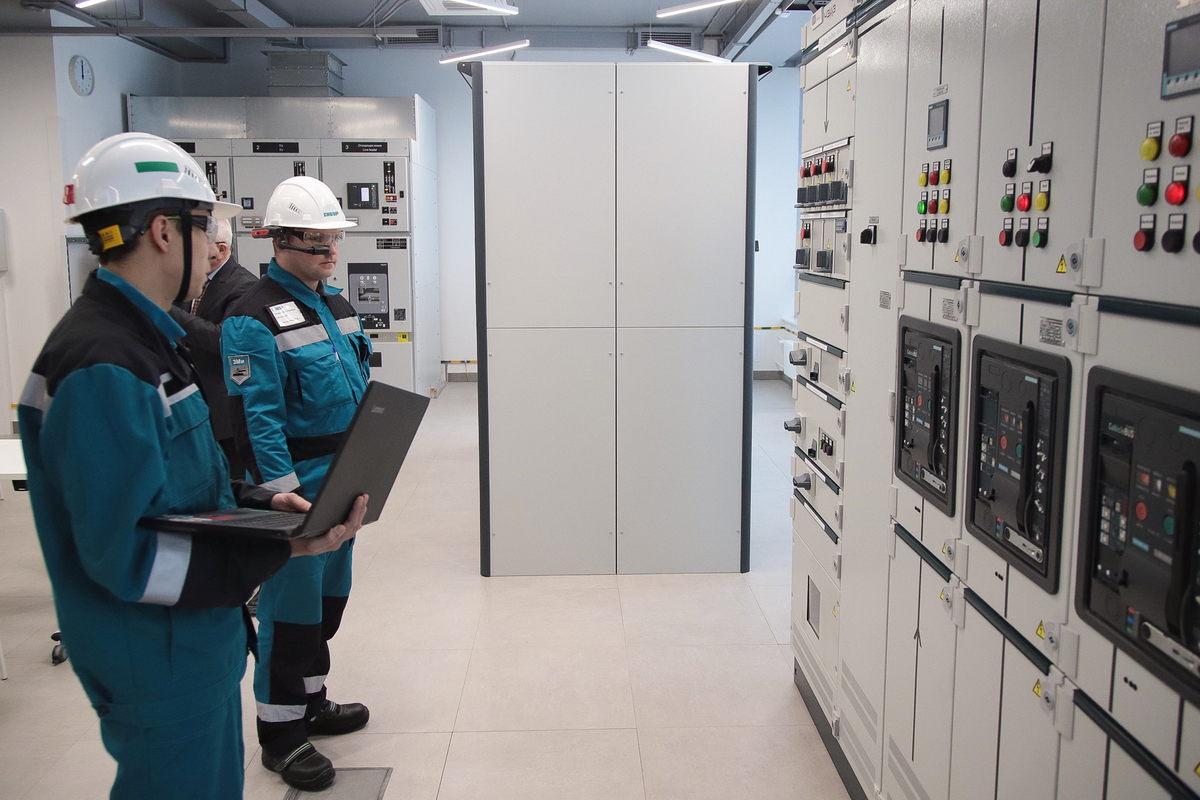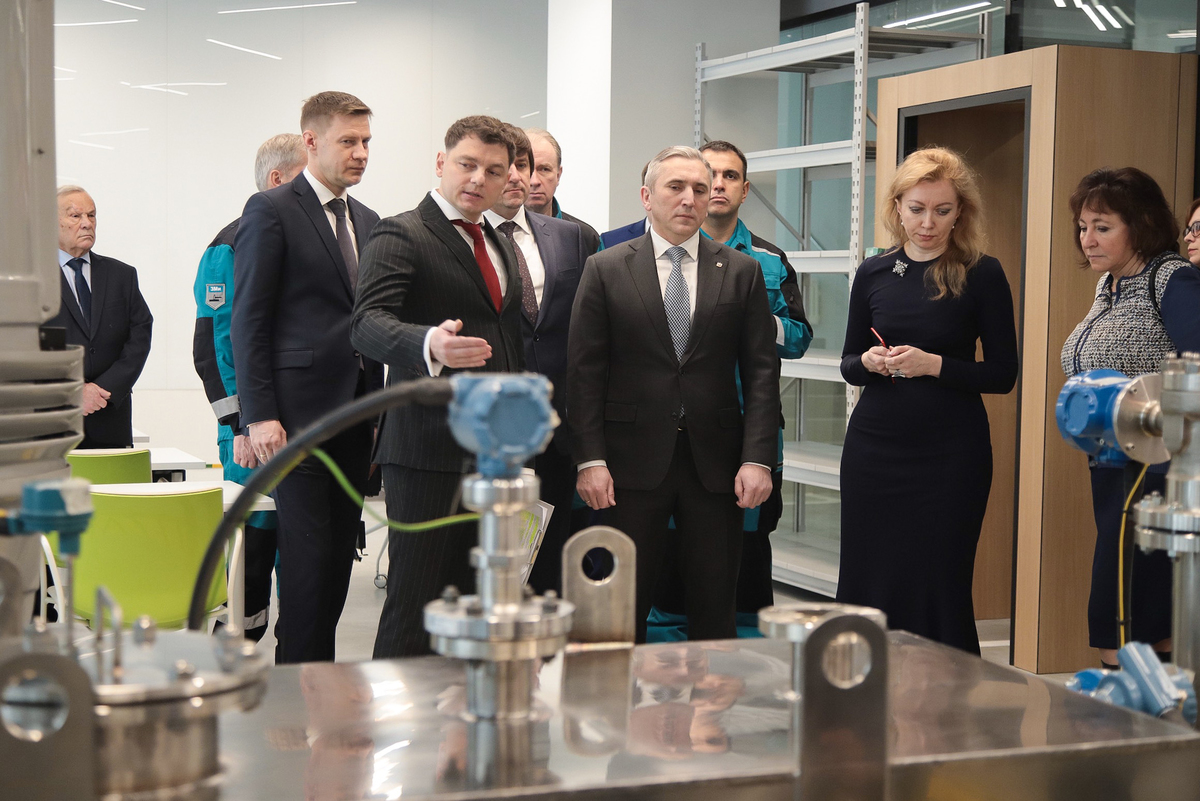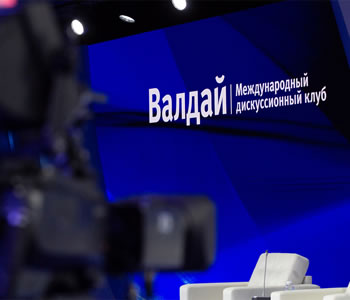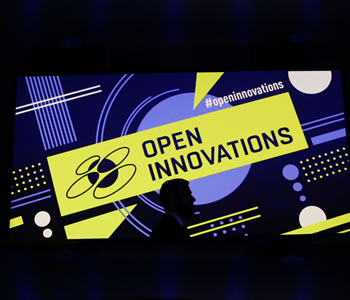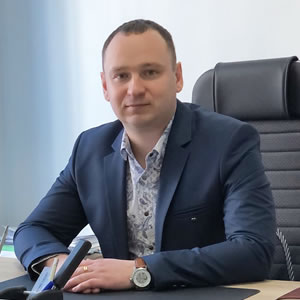Industrial companies of the future must be managed by professionals of the future – this is how SIBURINTECH defines the education it offers to future students. A wide selection of theoretical and practical programmes, paired with partnerships with global brands and UNESCO, will help improve the quality of technical education in Russia, integrate specialists into the international professional environment, and unlock the potential of the Russian engineering school.
A production site environment
The innovative educational facility in Tobolsk is set to become the core centre for developing engineering and technical expertise at SIBUR. The centre also offers training to employees of other oil and gas companies, as well as students of industry-specific technical colleges and universities. Unique in scale, design and contents, and promoting all aspects of professional development, the training centre makes a deep impression even fr om the first glance. Equipment fr om the world’s top manufacturers, the latest smart technology and simulator units built to SIBUR’s specifications – during their training, students are immersed in an environment that feels like an actual production site.
SIBURINTECH was launched in 2019. It currently boasts over 5,200 sq m of innovative space, 26 classrooms and more than 260 teachers
The project’s partners include world-famous brands: Festo, Siemens, Yokogawa and Schneider Electric, and training labs are fitted with a full range of Industry 4.0 digital technology solutions, 3D scanners and printers, as well as VR and AR systems. The teaching staff are experienced SIBUR employees, experts fr om renowned Russian and foreign technical universities, and developers of modern chemical technology. The centre’s educational programmes are tailored towards professional practitioners: only 20% of students’ time is devoted to theory, while the rest is practice in an environment close to an actual production site.
Teaming up with UNESCO and WorldSkills
The official opening of SIBURINTECH took place in October 2020, with the Russian Minister of Science and Higher Education Valery Falkov, Aide to the President of the Russian Federation Andrey Fursenko, Governor of the Tyumen Region Alexander Moor, and General Director of the Young Professionals Union (WorldSkills Russia) Robert Urazov as the guests of honour. The engineering centre of excellence was launched on the eve of the seventh WorldSkills Hi-Tech National Competition, wh ere workers from high-tech industrial sectors were able to once again show off their professional skills. SIBURINTECH hosted competitions in five competencies: Additive Technologies, Electrical Installations, Occupational Health and Safety, Environmental Protection, and Chemical Analysis Service.
SIBUR's unique engineering center will showcase the evolution of corporate training and a new approach to technical education.
The training centre will be able to accommodate up to 200 students per day, while developing the popular e-learning format in parallel
Robert Urazov, General Director of the Young Professionals Union (WorldSkills Russia) commented, “The SIBURINTECH centre will train new professionals sought after by our economy – but what does that mean exactly? A new professional is a specialist with both engineering and technical skills, who is able to manage expensive equipment worth millions of dollars without making mistakes, since the price of a mistake in modern high-tech production is incredibly high. These are the skills of the future that the industry desperately needs. It is vital that the opening of such centres is closely aligned with the WorldSkills movement, which we are all promoting together. SIBUR has been participating in corporate competitions since 2015, and in 2019 it became a platinum sponsor, making an invaluable contribution to the development of our movement.”
On top of that, UNESCO launched a regional office at the SIBURINTECH site on its opening day. Chairman of the Management Board at SIBUR Dmitry Konov, and Chairman of the Board of Governors of the UNESCO International Centre of Excellence for Education in Mining Engineering Vladimir Litvinenko signed a cooperation agreement. SIBURINTECH experts will have the chance to participate in the development of an international system for evaluating petrochemistry professionals, share their experience with colleagues, and align personnel training with foreign requirements for specialists. The joint activities we have planned with UNESCO include educational programmes, professional development courses, and internships for industry employees and students of industry-specific universities. The agreement between SIBUR and UNESCO will promote the development of technical education in Russia, the integration of Russian talent into the international professional environment, and the roll-out of national best practices in training engineering and technical personnel.
A few days later, SIBURINTECH hosted the first panel discussion wh ere representatives of the government, education system, business, science, and technology partners discussed the key challenges facing industrial companies when developing engineering expertise. The main topics for discussion were how the image of a modern employee at an industrial enterprise is evolving, and the relevance of developing new skills and competencies to match business needs.
“To remain efficient and competitive today, you have to do more than just focus on the construction of ultramodern, high-tech plants. SIBUR believes that changing its approach to doing business involves rethinking professional education standards, by investing in the development of new engineering and technical competencies and skills even before entering the workplace. Plants of the future must be managed by workers and engineers of the future. SIBURINTECH is our response to this challenge – a new approach to technical education. This modern training centre will produce a pipeline of talent capable of boosting the team of any enterprise engaged in the deep processing of hydrocarbons,” said Mikhail Karisalov, Chairman of the Management Board and CEO of SIBUR.
SIBURINTECH experts have developed training programmes covering the specifics of chemical production, mechanics, metrology, power engineering, and occupational health and safety
Supported by partners and suppliers
SIBUR’s permanent partners – suppliers of equipment and technologies for plants – were involved in equipping the SIBURINTECH training centre. Johan Vanderplaetse, President, Russia/CIS at Schneider Electric, knows how important it is for an educational platform to build cooperation with its equipment suppliers, “Suppliers’ technical experts can offer a unique combination of practical experience and fundamental knowledge. When supplying equipment to the training centre and taking part in the joint development of training methods, only the manufacturer can properly transfer competencies to the end customer, which ultimately helps reduce the industrial accident rate, prevent emergencies and minimise equipment failures.”
Stanislav Chernikov, Head of Training Center, Russia and CIS, at Schneider Electric, is willing to share his experience with colleagues, “Starting from 2018, Schneider Electric has been cooperating with SIBUR’s team to equip classrooms. In these two years, we have supplied training stands and samples, and developed methodologies for SIBURINTECH teachers. The Schneider Electric training centre has accumulated enormous practical and methodological experience in its 20-year history, which has allowed us to create a training facility packed with practical exercises and real-life cases. The courses will enable SIBUR specialists to hone their skills in accident-free equipment operation, and master best practices in building automation systems and in power distribution.”
Young specialists will be able to train on new modern equipment.
Vladimir Savelyev, General Director of Yokogawa Electric CIS, is pleased with the fruits of our joint efforts, “We produce equipment that automates technological processes; at SIBURINTECH, we have a training room with stands that help operators understand the entire production process in detail. These stands are valuable because they match the systems in place at the production site. SIBURINTECH will facilitate a major breakthrough in the petrochemical industry and other fields. And, frankly speaking, we are really proud to be involved in the creation of the centre. In the era of Industry 4.0, when technology is evolving rapidly along with requirements to professionals, it is important to be ahead of the curve, and this is wh ere SIBUR excels.”
Currently, not only industrial enterprises, but entire regions are seeking top young talent. SIBURINTECH can unlock the potential of company employees at all regional sites
Zhanna Shalygina, Director of Digital Industries at Siemens, Russia, raises the fact that there is a lack of talent with both industrial expertise and digital skills, “The range of digital tools and solutions is constantly expanding, and one of the barriers to business transformation is the shortage of talent. Siemens does not just supply new products and services for Russian industry, we also share technology, business models and know-how with our customers and partners when implementing projects.” Siemens’ industry-specific know-how in engineering and digitalisation is used at SIBUR Holding’s production sites and is showcased at the SIBURINTECH innovation centre.
Promoting educational standards
At SIBURINTECH’s opening, Roman Seleznev, Director of the SIBURINTECH engineering centre of excellence, started the day with a demonstration of a special technological stand to the guests, “This is our proprietary development, which actually simulates a process unit with the corresponding actuators, flow meters, and control system. Using this equipment, we can enable cross-functional interactions between various functions and arrange their work as efficiently as possible.” In a separate classroom, students practice the assembly and calibration of pumps and can simulate a fault and run a diagnostic using modern instruments. The power equipment classroom is a simulated transformer substation from an actual production facility. Technical and engineering staff practice the necessary skills in classrooms dedicated to relay protection and automation, automated control systems, work at height, and cargo safety.
Dedicated classrooms are equipped for training in occupational health and safety, as well as first aid. The training ground set up at SIBURINTECH allows students to build the necessary competencies for a safe working environment. In the in-house studio, teachers create training video content, while the VR classroom features immersive simulators for students to practice their profession, and in the technological modelling classroom engineers study the principles behind the effective set-up of production processes. On the fourth floor of the training centre, five classrooms feature special equipment to train students in the top 5 most promising jobs of the future. SIBURINTECH currently boasts over 5,200 sq m of innovative space, 26 classrooms and more than 260 teachers. The training centre will be able to accommodate up to 200 students per day.
In a global sense, SIBURINTECH demonstrates the evolution of corporate training and a new approach to technical education. A modern production worker is a versatile professional who has a good understanding of industry trends, possesses digital skills, and analyses their contribution to the enterprise’s financial performance and business efficiency. SIBURINTECH aims to educate a new generation of workers and engineers, promote jobs of the future, digitise production, and unlock the potential of the Russian engineering school. SIBUR stresses that the corporate centre of excellence should stimulate further modernisation of the industry and the non-commodity based economy in general. The centre’s experts are willing to develop training programmes in response to the requests of domestic industrial enterprises.
Governor of the Tyumen Region Alexander Moor (center) noted that specialists trained by SIBURINTECH will be in demand throughout the country.
Since its opening, SIBURINTECH has been contributing to the implementation of the Education National Project: the centre delivers training in five promising jobs in cooperation with the Russian Ministry of Education. The innovative training centre will not only contribute to making engineering and technical professions more popular, but it will also become a part of the professional training system for schoolchildren and college or university students. SIBURINTECH’s strategic goal is to provide industrial companies with versatile leaders, specialising in intellectual and digital production, rather than simply doers. This kind of training centre will bring continuous education to the industrial sector, while non-conventional training formats and technological innovations will support employees’ interest in their continuous development. Currently, not only industrial enterprises, but entire regions are seeking top young talent. SIBURINTECH can unlock the potential of company employees at all regional sites and roll out this expertise across the whole of Russia. Modern technical education has long left the confines of universities. SIBURINTECH is a centre for developing the competencies required by the rapidly evolving manufacturing industry.
“SIBURINTECH offers a new format for training highly qualified talent. Schoolchildren, technical college students and experienced specialists will be able to undergo training and practice here, using modern equipment that fully matches the specifications of SIBUR’s state-of-the-art production lines. The centre will create accomplished specialists, who will not need further training before working at innovative production sites,” said Alexander Moor, Governor of the Tyumen Region.
“By opening a major engineering centre of excellence, SIBUR has set a milestone for the petrochemical industry and the education system alike,” said Valery Falkov, Russian Minister of Science and Higher Education, “Firstly, it will serve as a major driver for raising the prestige and status of engineering and technical professions, and will attract young talent to the industry. Secondly, since the centre offers training programmes for university students, it will take practice-oriented education to a fundamentally new level and train specialists with a broader set of knowledge and competencies not only in petrochemistry, but also in digital technology, industrial safety and other related areas. In the future, the centre may become the base for an innovative scientific and technical cluster in modern petrochemistry.”
Download PDF

